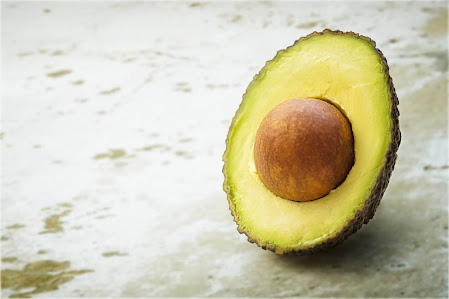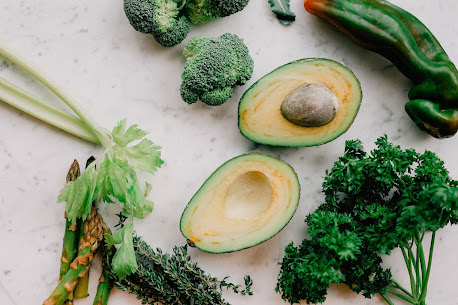AVOCADO BENEFITS (Health Fitness)
AVOCADO Health Fitness
 |
| Health Fitness |
Many people call avocado a super food because of its healing properties. Avocados are rich in monounsaturated fatty acids that help lower cholesterol levels. The American Heart Association claims that maintaining a healthy cholesterol level with healthy fats reduces the risk of heart disease and stroke. Like bananas, avocados are rich in potassium. They also contain lutein, an important antioxidant for healthy eyes and skin.
Avocados are a stone fruit that grows in warm climates with a creamy texture. Their health benefits include better digestion, reducing the risk of depression and protection from cancer. Health Fitness
Avocado is a naturally nutritious-dense food and contains about 20 vitamins and minerals.
This MNT Knowledge Center facility is part of a collection of articles on the health benefits of popular foods.
Avocado is a bright green fruit with large pits and dark skin. These are also known as crocodile pear or butterfruit. Avocados are a favorite of the production department. They are a go-to substance for guacamole dips. And they are changing everything from salads and wraps to smoothies and brownies. So sure, this pear-shaped berry makes (yes, that’s true!) Such a super food.
Many people think that avocado is a veggie, but in reality it is a pear shaped berry (which is perfect for my friends, it is a fruit).
However, from a food point of view you may want to consider it as fat. In other words, if you are trying to include more fruits in your diet, I would not suggest eating more avocados, but if you are trying to include more healthy fats in your diet, avocado is your best friend.
You don’t want to worry about the fat in your avocado, it’s the mono-unsaturated fat you can eat, which is healthy fats. In fact, here is what the American Heart Association has to say about monounsaturated fat: They also provide nutrients that help your body cells grow and maintain. Monounsaturated fats are also high in vitamin E, the antioxidant vitamin most Americans need."
Vitamins A, E + K, rich in fat soluble, avocado contains vitamins B, C and minerals including magnesium and potassium (both help lower blood pressure). To give you a moderate mental picture, an avocado contains 2 times as much potassium as a banana. Health Fitness
They have more protein and less sugar, then there are no other fruits on the market and they are packed with antioxidant and inflammatory properties.
BENEFITS OF AVOCADO Health Fitness
 |
| BENEFITS OF AVOCADO Health Fitness |
Cancer
Avocados may also play a role in the treatment of cancer, with some research suggesting that phytochemicals extracted from avocados may selectively cause cancer and cancer cell growth and cause cancer cells to die, while at the same time stimulating the proliferation of cells of the immune system called lymphocytes. These phytochemicals have also been shown to reduce chromosome damage caused by chemotherapy called cyclophosphamide. There is limited evidence that avocado is beneficial in the treatment and prevention of cancer. Test-tube studies suggest that it may help reduce the side effects of chemotherapy on human lymphocytes. Avocado extract has been shown in the laboratory to inhibit the growth of prostate cancer cells. However, keep in mind that these studies took place in separate rooms and do not need to prove what is happening in public. Human-based research is not available.
Eating avocado can help you lose weight
Avocados are high in fiber and low in carbs, so they promote weight loss. In addition, one study shows that people who eat avocado after a meal are 23% more satisfied. Against those who did not eat fruit, the desire to eat at least 5 hours was 28% lower in those people. Therefore, if avocado is included in their daily diet they will naturally take in fewer calories. There is some evidence that avocados are a weight loss diet. In one study, people who ate avocado preferred to eat 23% more satisfaction and 28% less in the next 5 hours compared to those who did not eat these fruits. If this is true in the long run, including avocados in your diet can help you eat fewer calories naturally and make it easier to stick to healthy eating habits. Avocados are high in fiber and low in carbs, two properties that can help promote weight loss, at least in the case of a healthy, true diet-based diet. Health Fitness
Reduces the risk of heart disease and cholesterol
In today’s busy lifestyle, people’s heart related diseases are increasing rapidly. Many premature deaths are due to high cholesterol, high blood pressure, stroke, and insufficient triglyceride levels. Avocados reduce the risk of heart disease. They significantly lower total cholesterol, lower blood triglyceride by up to 20%, increase high-density lipoprotein by 11%, and lower HDL by 22%. A low-fat, vegetarian diet further enhances its effects. Heart disease is the most common cause of death in the world. Many blood markers are known to be associated with increased risk. These include cholesterol, triglycerides, inflammatory markers, blood pressure and many others. Eight controlled studies in people have investigated the effects of avocados on these risk factors.
These studies have shown that avocados can.
Col significantly lower total cholesterol levels.
T Reduce triglycerides in the blood by 20%.
L LDL Cholesterol 22% lower.
Increase HD HDL (good) cholesterol by 11%.
One study found that a vegetarian diet, including low-fat avocados, significantly improved cholesterol profile. Although their results are impressive, it is important to note that all human studies are short and short-lived, with 13–37 people lasting only 1–4 weeks. Health Fitness
Effective nutritional value
For those who are health conscious, eating avocados is very popular. Superfoods include Vitamin K, Folate, Vitamin C, Vitamin B5, Potassium, Vitamin E, Vitamin B6, Magnesium, Copper, Fat Soluble, Iron, Vitamin A, Vitamin B2, Vitamin B3, Zinc and Manganese. , And phosphorus. They contain only monounsaturated fat, 2 grams of protein, oleic acid and 2 'net' carbs. In addition, there are no traces of sodium. All of these nutrients provide these nutritious fruits in 100 grams. Adding it to your diet will combine all these nutrients.
This healthy fat is thinner on the fruit
Avocados are rich in fiber, potassium (more than bananas!), And vitamins B6 and C. They are also rich in folate, which can boost your mood!
But no matter how you slice it, avocado is a nutrient that provides a lot of fat. In fact, one cup of avocado provides 21 grams of fat. The type of fat found in avocados is very important. And it is a mixture of mostly monounsaturated and polyunsaturated fats.
Polyunsaturated fats are essential. This means that your body needs them to function, but it cannot do them on its own. Your body uses these fats to cover cell membranes and nerves. And they are also necessary for blood clotting and muscle movements.
Monounsaturated fats are similar to the fats found in olive oil. Some studies have linked them to lower inflammation, increased risk of heart disease and anti-cancer effects.
While a lot of people discuss the health effects of certain types of fat, I think it’s like a debate over whether the trumpet is a good tool. Taken by itself, it makes sense. But when it comes to a talented band, playing amazing music, the equation changes drastically.
For me, avocado is the best orchestra ever assembled. Not only are they delicious - they have a wonderful and nutritious symphony of ingredients that combine to create a nutritious, satisfying (and, in my personal opinion, delicious!) Result. Health Fitness
And by contrast, one cup of avocado oil, one cup of avocado, provides 10 grams of fiber.
Avocados are loaded with fiber
Fiber is another nutrient that is high in avocados.
It is an indigestible plant substance that helps in weight loss, lowers blood sugar and reduces the risk of many diseases. Soluble fiber is known to nourish friendly gut bacteria in your intestines, which are very important for the proper functioning of the body. The fiber in avocado is 25% soluble and 75% insoluble.
Avocados are rich in nutrients
One serving (one-fifth of an avocado, about 40 grams), according to the USDA National Nutrient Database:
64 calories
6 About 6 grams of fat
3.4 grams of carbohydrates
Less than one gram of sugar
3 Approximately 3 grams of fiber
Avocados are a great source of vitamins C, E, K, and B-6, as well as riboflavin, niacin, folate, pantothenic acid, magnesium and potassium. They also provide lutein, beta carotene and omega-3 fatty acids.
Although most of the calories in avocado come from fat, it should not run away! Avocados are packed with healthy, beneficial fats that can help keep you full and content. When you eat fat, your brain gets a signal to reduce your appetite. Eating fat reduces the breakdown of carbohydrates, which helps keep blood sugar levels stable.
Every cell in the body needs fat. Eating healthy fats promotes skin health, absorbs fat-soluble vitamins, minerals and other nutrients, and also helps boost immunity.
Avocado eaters are healthy
One study looked at eating habits and the health of people who eat avocado.
They analyzed data from 17,567 people surveyed in the NHANES in the US. Health Fitness
Avocado consumers have found that they are healthier than those who do not eat this fruit.
They are high in nutrients and are half as likely to have metabolic syndrome, a group of symptoms that are a major risk factor for heart disease and diabetes.
Regular eaters of avocado have lower weight, lower BMI and lower abdominal fat. He also has "good" HDL cholesterol.
However, there is no reason to associate, and there is no guarantee that avocados are the reason these people stay in good health.
Great for vision
Avocados contain two phytochemicals, lutein and zeaxanthin, which are specifically concentrated in the tissues of the eye, where they provide antioxidant protection in reducing damage, including ultraviolet light.
Other benefits, such as the monounsaturated fatty acids in avocados, also help absorb fat-soluble antioxidants such as beta carotene, which can help reduce the risk of age-related macular regeneration by including avocados in your diet. . Avocados not only increase antioxidant absorption from other foods, they are also high in antioxidants. It contains carotenoids lutein and zeaxanthin, which are very important for eye health. Studies show that they are associated with a higher risk of cataracts and macular degeneration in the elderly. Therefore, eating avocado for a long time is good for your eye health. Health Fitness



